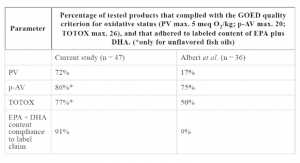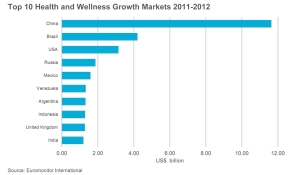Aldo Bernasconi, PhD, Director of Information and Research Global Organization for EPA and DHA Omega-3 (GOED)09.09.13
While much is known about omega 3 consumer awareness and usage levels in most of the world’s developed nations, less information is available about emerging economies. GOED has been undertaking a series of online consumer surveys to understand the characteristics and opinions of consumers and non-consumers of omega 3s and recently completed surveys in the BRIC countries. The acronym BRIC refers to Brazil, Russia, India and China, whose economies can be described as having recently become advanced. These four countries combined account for approximately 40% of the world population; they cover more than a quarter of all land area; and they account for more than 25% of the world’s GDP, a percentage expected to grow significantly over the next few decades.
The BRIC countries have seen a dramatic increase in their investment in science and technology, rapid job growth in these sectors and the development of a fast-growing middle class. The development of a newly affluent urban class, the sheer size of their populations and the increased development of a technology sector, with the corresponding increase in access to information, make these countries promising markets for omega 3 products.
Alike But Different…
While these countries are at a similar stage of economic development, they are extremely different from a geographic, historical, cultural and demographic point of view. A detailed understanding of the consumer classes in each of these countries is fundamental for developing commercial strategies, and may provide valuable insights about the potential markets in other emerging economies.
Usage of products containing omega 3 fatty acids is high in all four countries, particularly in Russia and India, where around 65% of people report consuming some type of omega 3s. By contrast, in Brazil and China the usage rate is lower at around 55%. There are big differences, however, in the sources of omega 3s. In Brazil and Russia, more than half report consuming oily fish, while the second most common source of omega 3s is fortified foods. Supplement usage in both countries is below 20%.
In China and India, fish consumption is closer to 35%, and is particularly low in India, at 32%, which isn’t surprising given that a large portion of Indians are vegetarian. In China, a comparable number of respondents obtain their omega 3s from fish, supplements and fortified foods, while in India the main sources are supplements, in particular vegetarian products.
In all BRIC countries, there are differences in usage by gender, but these differences are small (< 2-3%). The only exception is Brazil, where male respondents are more likely to use omega 3 products, and the difference is around 5%. In general, the rate of usage increases gradually with age, except in India, where it is relatively flat. This is to be expected as the well-known anti-inflammatory, cardio-protective and neuro-protective properties of omega 3 fatty acids make them important tools in the prevention of chronic diseases. It is reasonable to expect usage to increase with age as concerns about developing such conditions increase.
The presence of children in a household significantly increases the likelihood that an omega 3 product will be used, typically by around 5%, except in China, where having children registers an increase of a full 20% (from slightly over 40% to 60%). So does having children create a greater interest in improving or maintaining both one’s own health and that of one’s family, or does having children just naturally increase the likelihood of purchasing fortified foods (like formula)?
Fascinatingly enough, the answer is a combination. In all four countries, having a child in the household does increase the usage of omega 3 products across all product categories, indicating an increased interest in good nutrition. In three of the countries (Brazil, Russia and China), fortified foods is the category that sees the biggest jump in usage, and this could be reasonably attributed to an increase in the use of foods that are likely to be fortified. The exception is India, where the biggest jump is seen in the usage of (non-vegetarian) omega 3 supplements.
Health & Wellness Influencers
There are some revealing similarities and differences among countries regarding influencers of health and wellness decisions. In all four countries, health professionals and product quality are considered important influencers of health decisions and purchases, with at least half of all respondents (and in the case of Russia and China, nearly 70%) listing it as important. Brand reputation is also considered important, with between 30% and 50% of all polled listing it as an influence, except for Russia, where fewer than 15% of respondents state so. The clear conclusion is that Russian consumers do not believe that a well-known brand automatically equates with a high-quality product.
Price in all cases is less important than advice from health professionals: roughly half as many responders list it as important. This does not mean that price considerations are irrelevant: around one third of Brazilian and Russian responders list price as important, as do nearly a quarter of those polled in India and China.
In general, responders are less influenced by taste, but its relative importance is higher in India and China (10% list it as a consideration) than in Russia and Brazil (5%). Sustainability also rates low, with 10-15% of those polled listing it as important, except in India, where the proportion is slightly higher at 17%. Safety is considered more significant, with 40-50% of respondents listing it as important, except in Brazil, where only 20% of participants do. Finally, consumers in India and China are more influenced by their friends and family (25%) than those in Russia and Brazil (20% and 10%, respectively).
The story is similar when considering health and wellness priorities that drive purchasing decisions. Respondents in all countries except Russia list the health of their family as their main priority and their own wellness as a close second. In Russia, the importance of these two priorities is reversed, but not by much. With very small differences among nations, 50-60% of those polled list family health and wellness as important priorities.
Interestingly, it is not clear that people understand—or value sufficiently—the relevance of omega 3s to family health. While in Brazil and Russia those who list family health as a priority are more likely to use omega 3 products, the opposite is true of India and China. This result is somewhat counterintuitive, and may be explained by the fact that in most of these countries people who consider family health a priority are more likely to use multivitamins (the only exception is Brazil, where multivitamin usage is particularly low). It is possible that people in this group purchase multivitamins first, and having used the relevant part of their budget, opt not to use omega 3s.
The importance given by respondents to the prevention of chronic diseases is measured by asking them about the importance of heart health and brain health. With very small variation, between 25% and 30% of respondents declare that heart health is one of their priorities. There is considerably more variation in the proportion of people for whom brain health is a priority. This ranges from a little less than a quarter of all respondents (for Russia and India) to 30% (Brazil) and even 35% (China). It appears that people in all BRIC countries are aware of the benefits of omega 3s in the prevention of chronic diseases. In all countries, people who declare heart or brain health as priorities are more likely to use omega 3 products than those who do not.
The number of respondents for whom a good night of sleep is a priority is also high (between one quarter and one third of all respondents, for all countries), while having enough energy is valued by around 20% of Brazilian and Russian respondents, and more important in India and China (more than 35%). Only in China is there a difference in usage of omega 3 products between respondents who list energy as a priority and those who do not. As a matter of fact, those who list it as a priority are less likely to use these products. One possible interpretation is that consumers in these countries are not aware of any possible energy benefits of omega 3s. Moreover, in China, people who list energy as a priority may choose to purchase other products for this need, diverting their budgetary resources from omega 3s.
There are large differences among countries in the number of people who consider beauty a priority. While in Russia and China almost one quarter of all respondents consider beauty a priority, only 15% do in India, and even fewer in Brazil. In Brazil and Russia people who consider beauty a priority are more likely to use omega 3 products; in India they are as likely as those who do not, and in China they are less so. Again, this may be due to consumers choosing to purchase other products that they consider more effective or reliable.
The BRIC countries have seen a dramatic increase in their investment in science and technology, rapid job growth in these sectors and the development of a fast-growing middle class. The development of a newly affluent urban class, the sheer size of their populations and the increased development of a technology sector, with the corresponding increase in access to information, make these countries promising markets for omega 3 products.
Alike But Different…
While these countries are at a similar stage of economic development, they are extremely different from a geographic, historical, cultural and demographic point of view. A detailed understanding of the consumer classes in each of these countries is fundamental for developing commercial strategies, and may provide valuable insights about the potential markets in other emerging economies.
Usage of products containing omega 3 fatty acids is high in all four countries, particularly in Russia and India, where around 65% of people report consuming some type of omega 3s. By contrast, in Brazil and China the usage rate is lower at around 55%. There are big differences, however, in the sources of omega 3s. In Brazil and Russia, more than half report consuming oily fish, while the second most common source of omega 3s is fortified foods. Supplement usage in both countries is below 20%.
In China and India, fish consumption is closer to 35%, and is particularly low in India, at 32%, which isn’t surprising given that a large portion of Indians are vegetarian. In China, a comparable number of respondents obtain their omega 3s from fish, supplements and fortified foods, while in India the main sources are supplements, in particular vegetarian products.
In all BRIC countries, there are differences in usage by gender, but these differences are small (< 2-3%). The only exception is Brazil, where male respondents are more likely to use omega 3 products, and the difference is around 5%. In general, the rate of usage increases gradually with age, except in India, where it is relatively flat. This is to be expected as the well-known anti-inflammatory, cardio-protective and neuro-protective properties of omega 3 fatty acids make them important tools in the prevention of chronic diseases. It is reasonable to expect usage to increase with age as concerns about developing such conditions increase.
The presence of children in a household significantly increases the likelihood that an omega 3 product will be used, typically by around 5%, except in China, where having children registers an increase of a full 20% (from slightly over 40% to 60%). So does having children create a greater interest in improving or maintaining both one’s own health and that of one’s family, or does having children just naturally increase the likelihood of purchasing fortified foods (like formula)?
Fascinatingly enough, the answer is a combination. In all four countries, having a child in the household does increase the usage of omega 3 products across all product categories, indicating an increased interest in good nutrition. In three of the countries (Brazil, Russia and China), fortified foods is the category that sees the biggest jump in usage, and this could be reasonably attributed to an increase in the use of foods that are likely to be fortified. The exception is India, where the biggest jump is seen in the usage of (non-vegetarian) omega 3 supplements.
Health & Wellness Influencers
There are some revealing similarities and differences among countries regarding influencers of health and wellness decisions. In all four countries, health professionals and product quality are considered important influencers of health decisions and purchases, with at least half of all respondents (and in the case of Russia and China, nearly 70%) listing it as important. Brand reputation is also considered important, with between 30% and 50% of all polled listing it as an influence, except for Russia, where fewer than 15% of respondents state so. The clear conclusion is that Russian consumers do not believe that a well-known brand automatically equates with a high-quality product.
Price in all cases is less important than advice from health professionals: roughly half as many responders list it as important. This does not mean that price considerations are irrelevant: around one third of Brazilian and Russian responders list price as important, as do nearly a quarter of those polled in India and China.
In general, responders are less influenced by taste, but its relative importance is higher in India and China (10% list it as a consideration) than in Russia and Brazil (5%). Sustainability also rates low, with 10-15% of those polled listing it as important, except in India, where the proportion is slightly higher at 17%. Safety is considered more significant, with 40-50% of respondents listing it as important, except in Brazil, where only 20% of participants do. Finally, consumers in India and China are more influenced by their friends and family (25%) than those in Russia and Brazil (20% and 10%, respectively).
The story is similar when considering health and wellness priorities that drive purchasing decisions. Respondents in all countries except Russia list the health of their family as their main priority and their own wellness as a close second. In Russia, the importance of these two priorities is reversed, but not by much. With very small differences among nations, 50-60% of those polled list family health and wellness as important priorities.
Interestingly, it is not clear that people understand—or value sufficiently—the relevance of omega 3s to family health. While in Brazil and Russia those who list family health as a priority are more likely to use omega 3 products, the opposite is true of India and China. This result is somewhat counterintuitive, and may be explained by the fact that in most of these countries people who consider family health a priority are more likely to use multivitamins (the only exception is Brazil, where multivitamin usage is particularly low). It is possible that people in this group purchase multivitamins first, and having used the relevant part of their budget, opt not to use omega 3s.
The importance given by respondents to the prevention of chronic diseases is measured by asking them about the importance of heart health and brain health. With very small variation, between 25% and 30% of respondents declare that heart health is one of their priorities. There is considerably more variation in the proportion of people for whom brain health is a priority. This ranges from a little less than a quarter of all respondents (for Russia and India) to 30% (Brazil) and even 35% (China). It appears that people in all BRIC countries are aware of the benefits of omega 3s in the prevention of chronic diseases. In all countries, people who declare heart or brain health as priorities are more likely to use omega 3 products than those who do not.
The number of respondents for whom a good night of sleep is a priority is also high (between one quarter and one third of all respondents, for all countries), while having enough energy is valued by around 20% of Brazilian and Russian respondents, and more important in India and China (more than 35%). Only in China is there a difference in usage of omega 3 products between respondents who list energy as a priority and those who do not. As a matter of fact, those who list it as a priority are less likely to use these products. One possible interpretation is that consumers in these countries are not aware of any possible energy benefits of omega 3s. Moreover, in China, people who list energy as a priority may choose to purchase other products for this need, diverting their budgetary resources from omega 3s.
There are large differences among countries in the number of people who consider beauty a priority. While in Russia and China almost one quarter of all respondents consider beauty a priority, only 15% do in India, and even fewer in Brazil. In Brazil and Russia people who consider beauty a priority are more likely to use omega 3 products; in India they are as likely as those who do not, and in China they are less so. Again, this may be due to consumers choosing to purchase other products that they consider more effective or reliable.




















